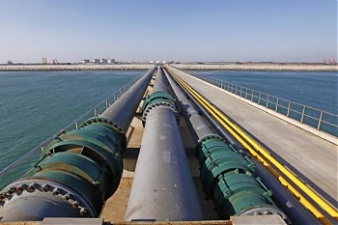Energy, EU – Baltic States, Gas, Good for Business, Legislation, Modern EU
International Internet Magazine. Baltic States news & analytics
Thursday, 22.05.2025, 05:30
Baltic States' electricity and gas connections with Europe
 Print version
Print version |
|---|
European Commission continued efforts to provide political support to the Baltic States in achieving independence in terms of electricity supply security and operation of their electricity grids. At the end of 2017, Commission Vice-President for Energy Union, Maroš Šefčovič and Climate Action and Energy Commissioner Miguel Arias Cañete met energy ministers from Estonia, Latvia, Lithuania and Poland to advance the synchronisation process of the Baltic States' electricity grid with the rest of Europe.
For historical reasons, the Baltic States' electricity grid is still being operated in close connection mode with the Russian and Belorussian systems. The synchronisation will bring closer a fully functioning and connected internal energy market and increase energy security of the Baltic States.
European energy union is aimed at ensuring secure, affordable and climate-friendly energy for the member states. Wiser energy use and combating climate change is both vital for creating new jobs, supporting growth and an investments.
Note: more information about the Baltic Energy Market Interconnection Plan (BEMIP) see in: https://ec.europa.eu/energy/en/topics/infrastructure/baltic-energy-market-interconnection-plan; on the European Energy Union see: https://ec.europa.eu/commission/priorities/energy-union-and-climate_en
Baltic energy-interconnection plan
The primary objective of the Baltic Energy Market Interconnection Plan, BEMIP is to end energy isolation, achieve an open and integrated regional electricity/gas market among the EU states within the Baltic Sea region. The BEMIP’s initiative “unites” European Commission, Denmark, Germany, Estonia, Latvia, Lithuania, Poland, Finland, and Sweden; Norway participates as an observer.
The first Memorandum of Understanding, MoU on BEMIP was signed in June 2009 and focused on electricity and gas markets, infrastructure and power generation. In June 2015, a new MoU was signed extending the initiative’s scope to security of supply, energy efficiency, renewable energy and integration of the Baltic States' electricity network into the continental European network, including their synchronous operation. Several working groups (e.g. on infrastructure, markets, gas and electricity security of supply, synchronisation, renewables and energy efficiency) analysed specific measures necessary for achieving the initiative's objectives and targets.
As part of the implementation of BEMIP, a number of cross-border and domestic infrastructure projects have been completed across the Baltic Sea region to further their integration with the Nordic electricity market. The completion of key electricity infrastructure projects such as Estlink, Nordbalt and the LitPol Link (connecting the three Baltic states with Finland, Sweden and Poland respectively) will significantly improve the Baltic countries' integration into the EU energy market, and their security of supply.
The Baltic States are now among the best interconnected regions of Europe, with an interconnection level of 23%. Nevertheless, further efforts are needed to complete remaining electricity and gas infrastructure projects, develop a regional gas market, and make the most of the region's energy efficiency and renewable energy potential.
The three Baltic states' electricity grid is still connected to Russian and Belorussian systems. A special BEMIP Working Group steers work on achieving the synchronisation of the Baltic's grid with the continental European network by 2025.
Source: EU solidarity and
regional cooperation: Integration of the Baltics into the European electricity
grid, Published on 15
December 2017.
Gas system in the Baltic States
Major gas projects in the Baltic States include
“Gas Interconnector Poland”, Lithuanian (GIPL), the Balticconnector*) project, and the development of infrastructure
between the Baltic states.
*) About gas pipeline “Balticconnector" between Estonia (77 km offshore and 54 km onshore) and Finland (152 km offshore and 21 km onshore). See more in: https://ec.europa.eu/energy/sites/ener/files/documents/pci_factsheet_balticonnector_2017.pdf
The GIPL aims to connect the Baltic States and Finnish gas networks with the continental European gas network by the end of 2021 and the Balticconnector will provide an important gas link between Finland and Estonia. The latter will connect the Finnish gas network with the continental European Network, ending Finland's gas isolation from the rest of mainland Europe. The project will allow Finland and the Baltic States to diversify their gas sources, providing alternative routes and increasing the security of gas supply and energy market integration in the region. This will foster competition on the market and ultimately provide consumers with a cheaper and more stable gas supply.
Source: Commission press release “Baltic Energy Market Interconnection Plan”, 15.xii.2017, in: https://ec.europa.eu/energy/en/topics/infrastructure/baltic-energy-market-interconnection-plan
Sectoral Commissioners’ reaction was quite positive: vice-president Maroš Šefčovič underlined that the Baltic States electricity grids’ synchronization with the rest of the EU signifies creation of a true European energy security system. By uniting markets and ending energy isolation, the Baltic States will strengthen their own electricity stability.
Energy Commissioner Miguel Arias Cañete added that the EU political decision on united European energy market will be supported by Union’s financing means. Political and financial resources form “an important milestone in the EU-wide energy market and improve security of supply in the Baltic States”.
Source: Commission's website at: https://ec.europa.eu/info/news/eu-solidarity-and-regional-cooperation-integration-baltics-european-electricity-grid-2017-dec-15_en?pk_campaign=ENERNewsletterJanuary2018.








 «The Baltic Course» Is Sold and Stays in Business!
«The Baltic Course» Is Sold and Stays in Business!

